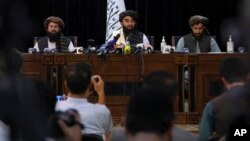A senior Taliban leader confirmed to VOA on condition of anonymity that the group is in the final stages of announcing a new Cabinet that was expected to include all members of its current Rahbari Shura, or leadership council.
Taliban supreme commander Hibatullah Akhundzada is holding the consultations in Kandahar, the city known as the birthplace of the Taliban, along with his deputies Sirajuddin Haqqani, the head of Haqqani network, and Mullah Mohammad Yaqoob, son of Taliban founder Mullah Omar and the head of Taliban military commission.
“Currently, the Taliban leadership is consulting with different ethnic groups, political parties and within the Islamic Emirate about forming a government that has to be accepted both inside and outside Afghanistan and to be recognized,” Sher Mohammad Abbas Stanikzai, another senior Taliban leader said in a televised address Saturday.
Taliban spokesman Zabiullah Mujahid told VOA the process was “near completion.”
“The leadership has assigned deputy chief Sirajuddin Haqqani and the other deputy chief Mullah Mohammad Yaqoob to finalize names for the cabinet,” the senior Taliban leader said. The final approval of the names would come from Akhundzada himself.
He said the Cabinet could have more than 26 members and might include people other than leadership council members.
The Rahbari Shura is the most important decision-making body for the Taliban and is headed by Akhundzada himself, who is called Ameer ul Momineen, or leader of the faithful.
While the Taliban claim the government will be inclusive, their spokesman said sharing power was not the group’s priority for now.
“There is no agreement with any political leader to induct him in the government,” Mujahid Said. “I want to make it clear that this is not our focus to share government with others.”
He said the group was seeking opinions of “known faces, ulema, former Mujahideen leaders” on the new system of governance.
The shura held its first formal meeting in Kabul after the takeover of the city in the Presidential Palace on August 21. Haqqani and Yaqoob jointly presided over it. Since then, shura members and other senior officials have been holding informal meetings almost daily.
“The shura has in principle decided that if the United States and other invaders complete their withdrawal by August 31, the Islamic Emirate [the Taliban name for their government] will announce the Cabinet,” the senior leader said. “The Amir ul Momineen is of the opinion that if a government is announced in the presence of the American forces it will raise many questions.”
He said the shura has also floated the idea that the announcement of the Cabinet should come from Akhundzada himself in a nationally televised address.
“If Amir ul Momineen does not want to appear in public, he could nominate a confidant and senior leader to make the announcement,” he added.
The shura was also of the view that the cabinet should be announced in the first week of September and the name of the new Taliban government should be Islamic Emirate of Afghanistan, but that decision required approval from Akhundzada.
The Taliban leader said they intended to keep the national army intact and include their own fighters into the institution. Decisions on the national flag and constitution were to be made by the new cabinet.
In their internal consultations, the Taliban were also discussing the possibility of making either Sirajuddin Haqqani or Mullah Yaqoob the “Raees ul Wazara,” a position equivalent to a prime minister. During the Taliban’s last government in Afghanistan from 1996 to 2001, Mullah Mohammad Rabbani, held this post as the head of the ruling shura of ministers.
Shura members are also discussing the possibility that if Haqqani becomes prime minister, Yaqoob could be defense minister, since he currently heads the military commission of Taliban.
Other than the formation of government, the leader said internal discussions were heavily focused on security in the capital, Kabul.
Two explosions, at least one of them a suicide bomber, outside Kabul’s airport last week killed at least 170 people including 13 American service members guarding the airport. The Islamic State Khorasan, the regional branch of IS, took responsibility for the attack.
Since the attack the Taliban have increased their security around the airport and set up checkpoints on roads leading to the airport.
Below is a list of members of Taliban’s Rahbari shura, expected to be included in their Cabinet when it is announced.
Mullah Abdul Ghani Baradar, head of the political office in Qatar’s capital Doha
Sheikh Abdul Hakeem, head of the Taliban negotiation team in Doha
Sher Abbas Stanekzai, deputy of the negotiation team in Doha
Sadar Ibrahim, former chief of the military commission
Abdul Qayyum Zakir, former chief of the military commission
Mullah Fazil, former deputy defense minister
Abdul Manan Akhund, brother of Taliban founder Mullah Omar
Maulvi Noor Muhammad Saqib, former Taliban chief justice
Amir Khan Muttaqi, former information minister
Abdul Salam Hanafi, member of the Taliban negotiation team in Doha
Qari Deen Muhammad, member of the Taliban negotiation team in Doha
Lateef Mansoor, member of the Taliban negotiation team in Doha
Sheikh Qasim, member of the Taliban negotiation team in Doha
Muhammad Zahid Ahmadzai, former Taliban diplomat in Pakistan
Maulvi Abdul Kabeer, former governor, Nangarhar province
Sheikh Abdul Hakim Sharee, an influential cleric
Noorulah Noori, former Guantanamo Bay detainee
Abdur Rahman
Mullah Gul agha
Ameer Haqqani
Mullah Mohammad Hasan
Sheihkh Sharif
Faizullah Khan
Taj Mir
Hafiz Majeed




